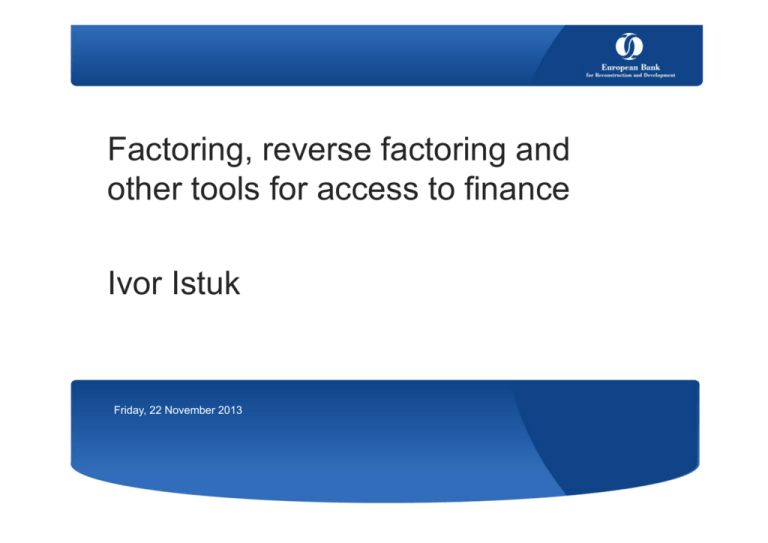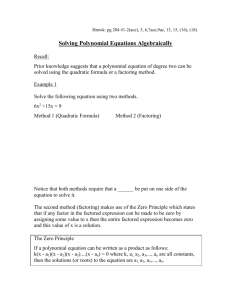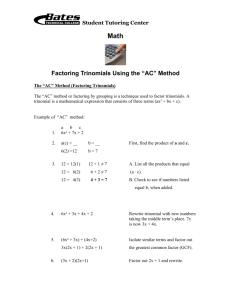Factoring, reverse factoring and other tools for access to
advertisement

Factoring, reverse factoring and other tools for access to finance Ivor Istuk Friday, 22 November 2013 OUTLINE Outline of presentation 1. Problem of late payments 2. Factoring – good mitigation tool • Defining factoring • Types of factoring • Benefits of factoring • Misuses of factoring 3. Regulatory framework 4. Legislative framework 5. EBRD work on promotion of factoring FACTORING AND THE LEGISLATOR • Turkey – Financial Leasing, Factoring and Financing Companies Law 2012 • Serbia – Factoring Law 2013 • Croatia – Factoring law under preparation • Montenegro – looking into regulating Squeezed liquidity of buyers and suppliers caused by late payment culture and hardened access to credit (World Economic Forum*) *http://reports.weforum.org/financial-development-report-2012 LATE PAYMENTS – Liquidity issues European Payment Index 2013 (Intrum Justitia Group, http://www.intrum.com/uk/) Payments between 30 – 90 days Payments Businesses adversly over 90 days affected by late payments Bulgaria 28% 24% 73% Croatia 40% 29% 73% Latvia 25% 25% 64% Lithuania 33% 16% 93% Poland 37% 8% 60% Romania 29% 25% 87% Russia 35% 7% 73% Slovenia 26% 18% 86% Turkey 43% 37% 86% LATE PAYMENTS – Liquidity issues European Payment Index 2013 PUBLIC MEASURE AGAINST LATE PAYMENTS • EU Directive 2011/7/EU on combating late payment in commercial transactions • • • • • Serbia – 2012 Late Payment Law • • • • Had to be transposed by 16 March 2013 Public authorities to pay for goods and services within 30 calendar days Private sector should pay their invoices within 60 calendar days Penalty interest of 8% above base rate chargeable Public authorities to pay for goods and services within 45 calendar days Private sector should pay their invoices within 60 calendar days Penalty interest chargeable, additional fines possible Turkey –2012 Commercial Code (Article 1530) • • • Addresses only private sector Payment of invoices to be made within 30 - 60 calendar days Penalty interest of 8% above base rate chargeable, additional fines possible BUSINESSES RESPONSE Negative • Delay account payable • Reduce inventory Unlikely • Bank lending • Increase working capital Positive • Actively pursue accounts receivables • Bill clients faster • (Cut overhead) • Increase prices • Sell invoices • Negotiate longer payment terms All three positive actions found in factoring FACTORING FUNCTIONS 1988 UNIDROIT Convention on International Factoring FACTOR Finance and administration SUPPLIER Assigns AR FUNCTIONS FINANCE Purchase of AR AR Default Protection ADMIN Maintenance of Accounts Collection of Receivables TYPES OF FACTORING Three basic criteria Transfer of risk • Nonrecourse • Recourse Place of business • Domestic • International (one or two factor system) Debtor notification • Disclosed • Silent (Invoice discounting) Other categorisations possible - depending on: the client’s involvement in collection (client as agent for factor) due date for payment of purchase price (maturity or payment of invoice) AR debtor contracts with factor instead of creditor - Reverse Factoring (Confirming, Supply Chain Finance) BENEFITS OF FACTORING SME SUPPLIERS • Quick access to working capital • Financing against buyers’ credit standing • Cuts administration overhead costs • Off balance sheet finance (nonrecourse) • Supports growth and diversification of business BUYERS • Extend payment terms • Outsourced ledgering (reverse factoring) • Improved relationship with suppliers ECONOMY •Transfers credit risk from real to financial sector (non-recourse) •Supports growth of businesses MISUSE OF FACTORING Improper use For capital expenditures equipment financing Transforms working capital into long term assets – (squeezes liquidity down the road) Last resort financing for loss making business Limited breathing space as long as new receivables are created (danger of recourse) – overtrading EBRD AND FACTORING EBRD (FACTORING) Financial Institutions Team Trade Facilitation Programme LTP Financial Law Unit Investing in factors (debt and equity) Short-term financial support to export/import factors Supporting regulation and legislation Exploring reverse factoring REGULATING FACTORING COMPANIES Three approaches Not regulated • UK – ABFA Russia, Slovakia, Belgium, Netherlands, Poland, Czech R., Lithuania, Estonia Regulated - no capital adequacy • Germany – BaFin Portugal, Romania, Bulgaria, Serbia, Norway, Turkey, Croatia, Greece, Hungary, Malta Regulated with capital adequacy • Italy, France, Austria, Spain licence, start up capital, qualified holdings control, approval of management, reporting, audit, internal organisational requirements (risk management and outsourcing) Basel capital adequacy requirements with some relaxations based on source of factor’s funding or on factor‘s membership in a group REGULATING FACTORING COMPANIES Three traditional criteria for application of capital adequacy regime large source of credit (macroeconomic significance) - - deposit taking intermediary in payment systems FSB, ECB and EU on shadow banking EU Green Paper 2012 - Broad definition raised concerns (credit intermediation and risk transfer component in particular) EC Communication on Shadow Banking – 04.09.2013 (securitisation vehicles, money market funds, hedge funds, PE funds, credit guarantees) – no factoring. SUGGESTED APPROACH BENEFITS OF LIGHT REGULATION licence, start up capital, qualified holdings control, approval of management, reporting, audit, internal organisational requirements (risk management and outsourcing) Legitimises the industry Separates factoring from shadow banking, bad banks (NPLs) Incentivises Might help review of legislative attract investments base (pragmatic approach) LEGISLATIVE FRAMEWORK Factoring Based On Assignment of Accounts Receivable Important issues - Sale or security (non recourse - recourse) - Assigning future receivables (identification, bundle notice) - Priority rules (pledge, extended ROT) - Necessary formalities (availability of electronic assignment) - Effects of prohibition on assignment clauses SHOULD THE PROHIBITION ON ASSIGMENT CLAUSE BE RENDERED INEFFECTIVE AGAINST FACTORS? Two possible effects of the clause: 1. To render the assignment invalid 2. To allow debtor to disregard notice Arguments in favour Arguments against • Abuse of market position • Freedom of the contract • Know your creditor not relevant for trade credit (short term fixed relationship) • Administrative burden – costs • Factoring regulated service • Choose your creditor (financiers – less flexible) • Impedes competition for trade credit • Competition Law Issue • Impedes factoring (impossible or risky) • Competition policy takes time CLAUSE RENDERED INEFFECTIVE INEFECTIVE FOR FACTORING NATIONAL LAWS • • • • • • • • • • US (UCC9) Canada, AU (PPSA) Italy (Factoring Law) Serbia (Factoring Law) Latvia (Comm. Code) Romania (Law 99/1999) Croatia (Draft Law) Greece (practice) France (CC Subrogation) Austria (CC - limited) INTERNATIONAL CONVENTIONS • Unidroit Convention on International Factoring (1988), Art 6 • UN Convention on the Assignment of Receivables in International Trade (2001), Art 9 REVERSE FACTORING PLATFORM Basic elements Platform Operator Electronic transfers Agreements Buyers Factors Suppliers Supply Chains Suppliers grouped under big buyers Financing Chains Automatic offers Interested factors grouped under big buyers (competition) Offers created upon electronic confirmation of invoice under - pre generated terms REVERSE FACTORING PLATFORM Typical transaction Developing Reverse Factoring Challenges Factors do not want competition Include state owned buyers (companies, funds, etc.) on the platform to attract factors Channel SME support financing via platform (state, IFI, etc. - risk sharing, participations, subsidies, etc.) Buyers want to do it themselves (earning margin) Make prohibition on assignments ineffective Promote benefits of platform Nacional Financiera (Nafin) Mexico Example of Reverse Factoring Platform • Nafin - Mexico’s development bank started platform in 2001 • Factoring market share from 2% in 2001 to 75 % in 2010 • In 2009 - 700 big buyers (35 % public and 65 % private sector) • In 2009 - 27,000 SMEs funded, amounting to US$15.9b • Nafin generates revenues out of the interest that factors pay for their capital refinancing (subsidy – development bank) • Out of revenues it covers all legal expenses and factoring fees • Factors only charge interest • Nafin is profitable and there are thoughts on state (subsidy) exit. OTHER TOOLS FOR ACCESS TO FINANCE Apart from factoring Financial Law Unit promotes Secured transactions (modernisation) Credit information systems (efficiency increase) Grain warehouse receipts Flexible laws conductive to modern business transactions Wide range of credit information collected (trade credit, utilities) Increasing reliability (licencing, indemnity funds) Electronic security interests registries Wide Accessibility Post harvest collateral Transparent procedures Trading Crop receipts (introduction) (systematization) Pre-harvest financing Future output as collateral Monitoring and Priorities Efficient enforcement







